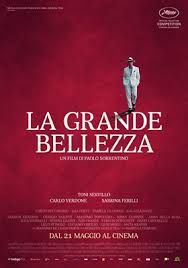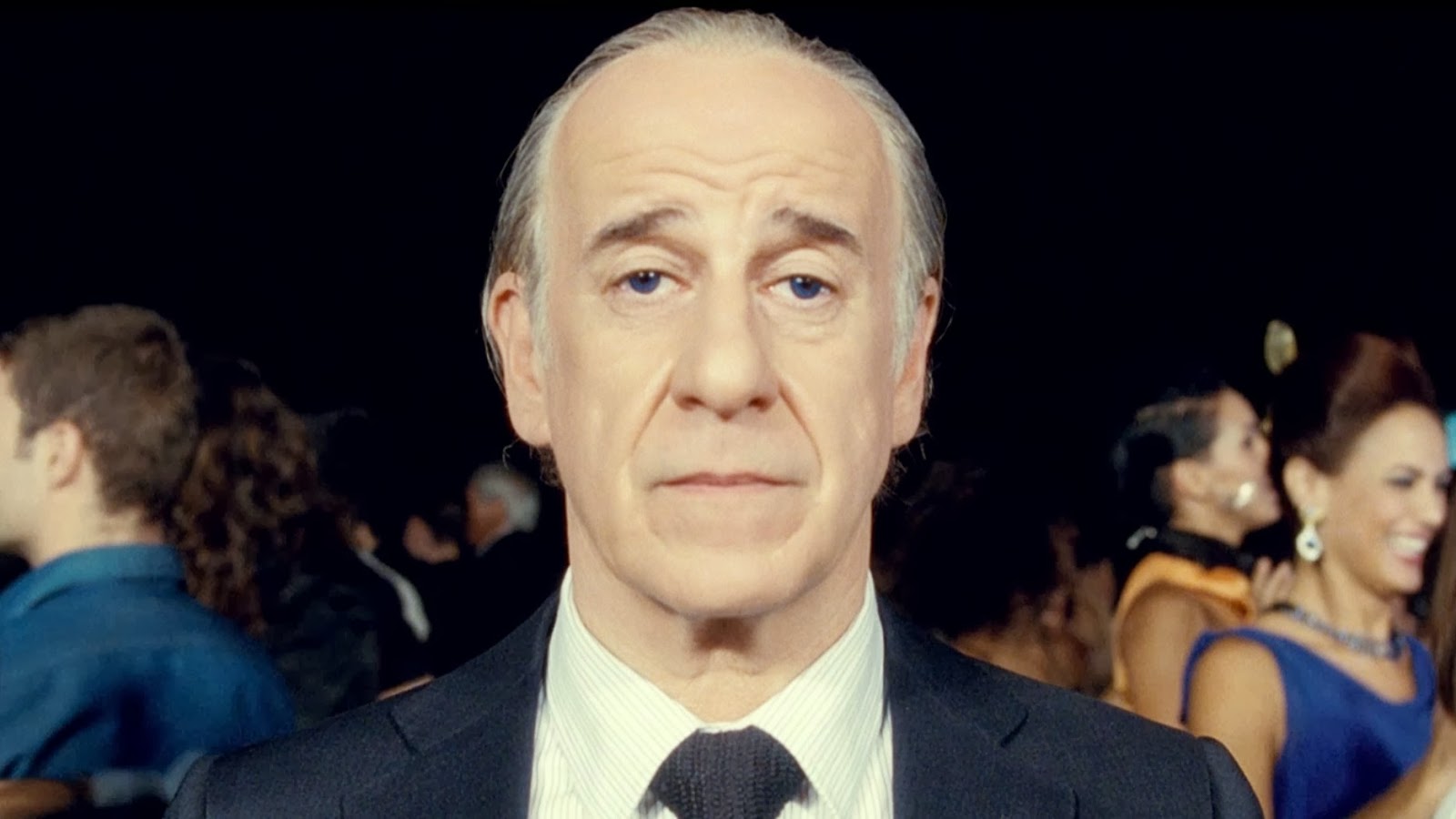When reviewers do not know where to start a review, they sometimes start by slagging off at other reviews. In that spirit I recall a review of an exhibition of Impressionist paintings complaining that it was too French; another that faulted a film about cricket for too many references to cricket. Then there are film reviews that find Hollywood movies so American. I can say, without fear of contradiction that ‘The Great Beauty’ is very Italian. That is why we went; to see some of Italy without the travel.

‘La grande bellezza’ poster
The film features that greatest of Italian film stars: Roma itself.
The other actors, fine though they be, are supporting players to this great star with its architecture, its lavish art works, its vistas, its history evoking buildings, it inspiring sunsets and ravishing sunrises, its profligate statuary, its intimate chapels and by-ways, its grande boulevardes, its…. Well, one sees the point by this time, or will never see it. The film is a paean to Roma.
Jep, played superbly by a very serious actor Toni Servillo, has frittered away his talent as a novelist along with his humanity, by living the indolent life Roma offered him with a spacious apartment overlooking the Colosseum, bedding so many willing women that he has long since lost count, rising at 3 pm on many days to party the night away. His being is certainly light in the sense of Milan Kundera’s ‘the lightness of being.’ To reach for another metaphor, it is the ‘feathered life,’ as the Aztecs offered their sacrificial victims before the knife. I read it as a character study but he could be taken as an exemplar of the milieu in which he swims, and thus the film offers some social criticism, too.
Sounds familiar? Yes, ‘La Dolche Vita’ (1960) comes to mind and there are many fountains. By the way, ‘La Dolche Vita’ is thirty (30) minutes longer than ‘La grande bellezza,’ which is listed at 142 minutes. Yet it held our attention as did ‘La Dolche Vita.’ Confession, one also thinks Silvio Berlusconi who defies parody. Then there is Fellini’s own ‘Roma’ (1972) with the Master’s taste for disconnection and the grotesque.
‘La grande bellezza’ has many tributes to Federico Felllini in its tableaux, its return to the sea, and — it has to be said — the dwarf, who here is a real person, not a circus prop, and even a giraffe, a knife thrower, performance art, and on and on.
Jep at 65 is bored, bored, bored, bored; he is also sometimes boring. He lives like a king, dresses like a prince, wanders the haut monde with nary a care in the world, except the dawning realization of his mortality. Jaded, cynical, and worn he is, yet he is not bitter, not angry, not a victim. But he is defeated. He wrote one novel forty (40) years ago, yet he still occasionally meets people who quote from it. He brushes off their admiration and when they ask him about another, second novel he is so long-practiced at diversion that the question does break his emotional skin. Instead he writes witty fluff for a newspaper which must pay him way over the odds so he can afford all those perfectly tailored 3,000 thread-count suits he wears.
It is all trip and no arrival. Much happens, but nothing matters. A tourist faints. Is that part of the story? It is not part of Jep’s story, no, but it is part of Roma’s story. A young man is killed in a car crash, or kills himself by crashing his car and either way drugs may have been involved. His life does not go on, but Roma’s does. One of Jep’s girlfriends dies and he hardly notices. He goes on … for now. Roma goes on forever.
In addition to the gorgeous photography of Roma in its many faces there is a wondrous array of music — some ethereal, some energising, some reassuring, and some that sounds like a train wreck — in the soundtrack, and all the Milano style in the clothes on the actors. Though in Roma the Milano labels would be cut out. Eye and ear candy supreme.
For the viewer it is two and half hours spent following a camera around Roma over the shoulder of a wastrel named Jep. The camera is at times sinuous, at other time inert, then it seems to dart through the air, or float over the Tiber. However, Jep, no fool, is completely self-aware and perhaps he may yet try to write another novel, but probably not. It makes no matter to Roma.

Tony Servillo as Jep
I refered to Toni Servillo as a serious actor because I have seen him many times before, including as the very humane detective in ‘The Girl by the Lake’ (2007), a surprising story of what people will do for love. He also directed ‘Propaganda’ (1979) and ‘Guernica’ (1985). Both as serious as the titles suggestion. Though he smoked enough cigarettes in this film to reduce his chances of doing much more work.
Skip to content
